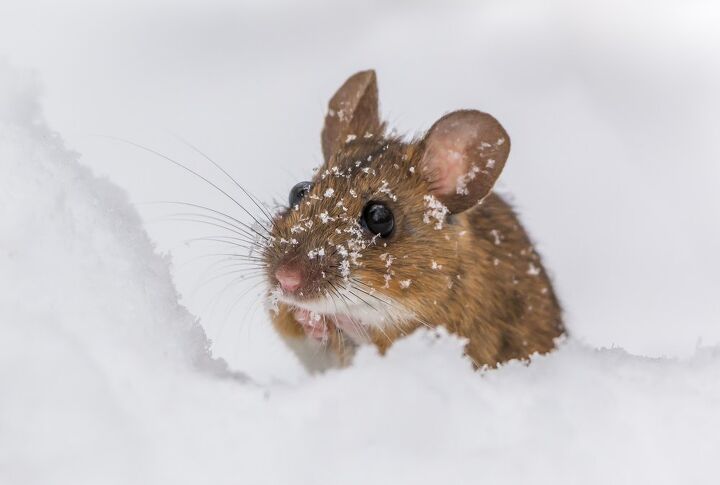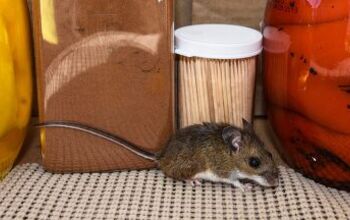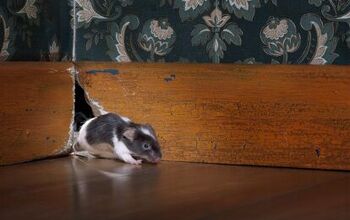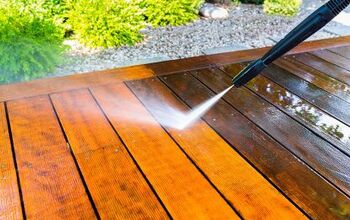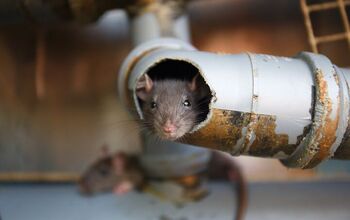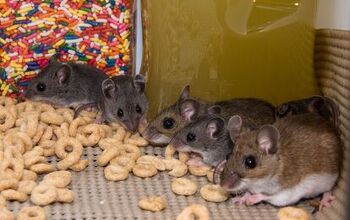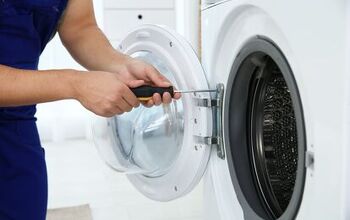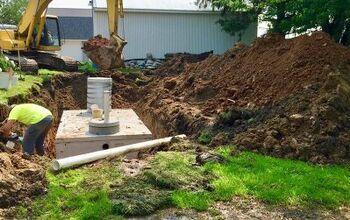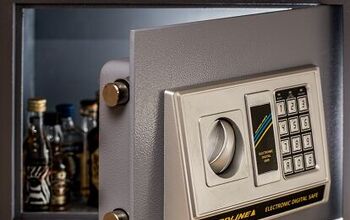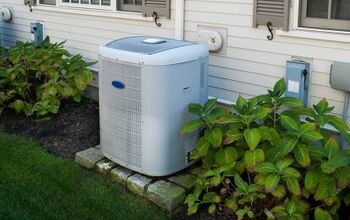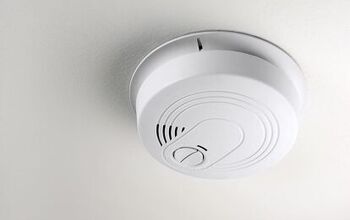Do Mice Hibernate In The Winter? (Find Out Now!)

Do mice hibernate in the winter? This is a completely valid question if you’ve ever experienced any sort of rodent activity in or around your home, or you’re concerned that mice may move into your living areas in search of warmth during the winter months. Humans aren’t the only ones that want to stay warm in cold weather, as most mammals share the same instinct of hunkering down and staying cozy indoors.
Contrary to what most people believe to be true, mice do not hibernate in the winter. Both mice and rats remain active throughout the entire year, even when it’s cold outside. In fact, it’s not uncommon to have more sightings of mice in your home during the winter than in warmer months.
Whether you’ve recently spotted signs of a mouse on your property or you’re worried that mice may make their way into your home at some point, let’s take a look at some common questions that homeowners have regarding mice and their habits – including what they do during the coldest months of the year.
Do You Need Pest Control Services?
Get free, zero-commitment quotes from pro contractors near you.

Where Do Mice Live in the Winter?
Mice enjoy living outside when the weather is temperature – during spring, summer, and into early fall. They will set up shop in a variety of habitats, including forests and grasslands. Mice may construct nests out of cotton, grasses, and other materials they find lying around, or burrow underground. Overall, these rodents tend to be relatively migratory, meaning that instead of staying in one place for an extended period of time, they prefer to move from location to location based on food availability.
During warmer months, seeds, fruit, grains, nuts, and other foods that mice prefer are in sufficient supply outside. This is when they will try to gather and store as much as they can to prepare for the impending winter. Beginning in the fall, when the temperatures start to dip, mice will usually move indoors. Oftentimes, they will go to great lengths to avoid the cold weather. This is why it’s so common to see mice inside heated homes and apartment complexes in the winter.
Mice will build nests in dark, secluded areas of a house, including basements, attics, and wall voids. They will pick locations that are, ideally, close to a food source so they have enough nourishment during winter.
Do Mice Hibernate in the Winter?
Even if mice live outdoors in the winter, they do not hibernate. However, there are some species – such as deer mice – that will become dormant and sleep for long periods of time during the winter. On warm days, the rodents will wake up and forage for food, which helps them survive without actually hibernating.
Since mice do not hibernate in winter and are also seeking out warm shelter, food sources, and water, infestations are very common during these months. Mice can cause a host of problems being indoors, from destruction of your property to the spread of disease and parasites.
Do Mice Like Cold Weather?
Considering the fact that mice head indoors and seek out warmth during the winter, it’s safe to say that no, mice do not like cold weather. These rodents can die when they’re exposed to harsh elements such as cold, snow, wind, and ice. Their litters are incredibly vulnerable in these temperatures and have a better chance of survival when it’s warm outside and there’s sufficient food available.
For this reason, mice typically prefer to procreate during warm seasons. However, they can, and will, have babies in the winter, particularly if they find a warm, safe, protected location to build a nest and live off of a food source – i.e. in your home.
Being inside during winter offers a ton of advantages to mice. If they were to remain in the wild, the shift in temperatures can limit mouse production. Moving indoors in warm, temperature-controlled homes, mice are able to breed throughout the winter. They are breeding machines, producing a litter approximately every 28 days.
How to Keep Mice Out of Your House in the Winter
As the temperature starts to drop, mice will ultimately try to take up shelter inside your home. While there aren’t any completely fool-proof ways to prevent mice, there are steps you can take to deter them. That said, follow these tips for keeping mice out of your house in the winter:
1. Eliminate potential entry points
To effectively prevent mice from trying to get into your home, it is crucial that you seal off any spots that they use to gain entry. Mice are known for being able to squeeze through very small gaps. So, a good rule of thumb is to close off any openings that are ¼ inch and larger.
Possible areas that may need sealing include loose siding, cracks in your foundation, poorly sealed window and door frames, holes around dryer vents, and tears in window screens. Don’t forget to add a cap to your chimney, as mice are excellent climbers as well!
2. Remove clutter
Mice love clutter, as it provides plenty of hiding spots for them to build their nests. This is especially the case in areas of the home that see infrequent human activity such as attics, garages, and basements.
Tidying up and removing the clutter can make these areas less appealing to mice. This means elevating stored items off the ground, picking up piles of laundry, clearing out stacks of old newspaper, cleaning up your child’s toys, and getting rid of any other junk lying around. The goal is to achieve wide, open spaces, as the mice won’t feel like they have enough cover from predators.
3. Elevate your firewood
If you burn firewood in the winter to keep your home warm, you likely have a stockpile of wood nearby. However, wood is an ideal hiding spot for mice. To keep your home and property rodent-free, elevate your firewood at least 18 inches from the ground. It should also be stored at a distance away from your house to deter mice from setting up camp directly outside.
4. Install brush strips
Brush, or sweep, strips can be installed on all your exterior doors as another excellent way to keep mice from getting inside. These strips are designed to block the small gap at the base of your door, which is particularly common with older doors and makes an ideal entry point for mice.
To make installation easier, opt for a brush strip that comes with adhesive rather than screws. As an added advantage, this approach can save you money during the winter by preventing heat from escaping outside.
5. Keep your kitchen clean
A kitchen with crumbs left on the floors, counters, and in the sink will attract mice like moths to a flame. For this reason, it is important that you keep your kitchen as clean as possible. Stick to a regular cleaning schedule and make sure that all your dry food items are well-sealed in containers that mice cannot chew through. This includes also keeping your pet’s food sealed and removing and cleaning their food bowls and water bowls in between meals.
Consider the following daily cleaning checklist to keep mice out of your home in the winter:
- Wipe down countertops
- Sweep, mop, or vacuum floors
- Clean up food spills immediately
- Keep food sealed in airtight contains or in the fridge
- Avoid leaving pet food bowls out
6. Considering getting a cat
Cats are natural predators to mice. Not only are they great at sniffing out the presence of mice and hunting them down, they also give off a scent that mice register as predatory and will generally steer clear of. If you’re concerned about mice getting into your home, consider getting adopting a cat. As an added bonus, cats are excellent companions.
7. Maintain your landscaping
Before the weather gets too cold for yard work, make sure that your shrubs and gardens are tidy and perform all necessary yard maintenance. Trim back branches that hang near your home as this provides easy access for mice to climb on your roof and into your attic.
Keeping your yard tidy will also help you stay on top of any new points of entry that may develop. Finally, be sure to remove weeds, overgrown vegetation, and clean up leaf piles to ensure that mice have fewer hiding spots around your home.
Do You Need Pest Control Services?
Get free, zero-commitment quotes from pro contractors near you.

Signs You Have A Mice Problem
If you’ve started to suspect that you may have mice in your home based on the strange scratching, rustling, and gnawing noises you’re hearing at night, you’re on the right track. However, these noises aren’t the only indication that you have mice in your house. Keep a look out for any of these signs:
- Mouse droppings left behind in trails that are black and the size of rice.
- Evidence of chewing on boxes, clothing, plastic containers, and wooden spoons.
- A foul ammonia-like odor, indicating mouse urine.
- Mouse passageways and tunnels in insulation.
- Nests made from materials like cloth and shredded paper.
Mice may not hibernate in the winter, but that does not mean that they have to live in your home rent free. Keep an eye out for signs and arm yourself with the aforementioned tips to ensure that mice stay out of your home this season.

Jessica considers herself a home improvement and design enthusiast. She grew up surrounded by constant home improvement projects and owes most of what she knows to helping her dad renovate her childhood home. Being a Los Angeles resident, Jessica spends a lot of her time looking for her next DIY project and sharing her love for home design.
More by Jessica Stone



